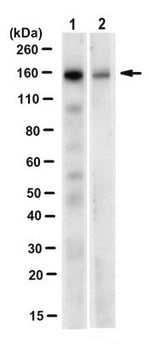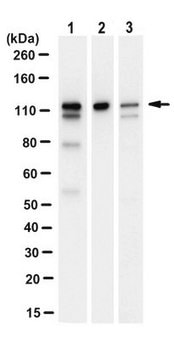推荐产品
生物源
rabbit
品質等級
抗體表格
purified antibody
抗體產品種類
primary antibodies
無性繁殖
polyclonal
物種活性
mouse, human
技術
immunocytochemistry: suitable
NCBI登錄號
UniProt登錄號
運輸包裝
wet ice
目標翻譯後修改
unmodified
基因資訊
human ... SH3PXD2A(9644)
一般說明
Tks5 (previously known as Fish), is a large scaffolding protein with one amino-terminal PX domain and five SH3 domains. It is cytoplasmic in normal fibroblasts. In Src-transformed cells, Tks5 localizes to podosomes. The coexpression of Tks5 and constitutively active Src in epithelial cancer cells resulted in the appearance of podosomes/invadopodia. Cells with reduced Tks5 expression are poorly invasive through matrigel. Tks5 is expressed and localized to podosomes/invadopodia in some invasive human cancer cell lines and tumor tissue, particularly breast cancers and melanomas. Thus, Tks5 appears to be required for podosome/invadopodia formation and for invasion of some cancer cells.
免疫原
Epitope: 833-892 aa
Recombinant Protein, aa: 833-892
應用
Anti-TKS5 (SH3 #4) Antibody is an antibody against TKS5 (SH3 #4) for use in IC.
Research Category
Cell Structure
Cell Structure
Research Sub Category
Cytoskeletal Signaling
Cytoskeletal Signaling
品質
Evaluated by immunocytochemistry on mouse 3T3-Src(Y527F) cells.
標靶描述
130-150 kDa Uncharacterized bands(s) may be observed in some cell lysates.
外觀
Protein A purified
Format: Purified
Purified in 0.1M Tris-Glycine (pH7.4) 150mM NaCl with 0.05% NaN3.
儲存和穩定性
Maintain at 2-8°C in undiluted aliquots for up to 1 year after date of receipt.
分析報告
Control
Mouse 3T3-Src(Y527F) cells
Mouse 3T3-Src(Y527F) cells
其他說明
Concentration: Please refer to the Certificate of Analysis for the lot-specific concentration.
免責聲明
Unless otherwise stated in our catalog or other company documentation accompanying the product(s), our products are intended for research use only and are not to be used for any other purpose, which includes but is not limited to, unauthorized commercial uses, in vitro diagnostic uses, ex vivo or in vivo therapeutic uses or any type of consumption or application to humans or animals.
未找到合适的产品?
试试我们的产品选型工具.
儲存類別代碼
12 - Non Combustible Liquids
水污染物質分類(WGK)
WGK 1
閃點(°F)
Not applicable
閃點(°C)
Not applicable
Lidia Chellini et al.
Matrix biology : journal of the International Society for Matrix Biology, 81, 17-33 (2018-10-28)
The invasive phenotype of serous ovarian cancer (SOC) cells is linked to the formation of actin-based protrusions, invadopodia, operating extracellular matrix (ECM) degradation and metastatic spread. Growth factor receptors might cause engagement of integrin-related proteins, like the polarity protein IQ-domain
Olivia R Grafinger et al.
Journal of cell science, 133(9) (2020-03-25)
Malignant cancer cells can invade extracellular matrix (ECM) through the formation of F-actin-rich subcellular structures termed invadopodia. ECM degradation at invadopodia is mediated by matrix metalloproteinases (MMPs), and recent findings indicate that membrane-anchored membrane type 1-matrix metalloproteinase (MT1-MMP, also known
Cameron P Bracken et al.
The EMBO journal, 33(18), 2040-2056 (2014-07-30)
The microRNAs of the miR-200 family maintain the central characteristics of epithelia and inhibit tumor cell motility and invasiveness. Using the Ago-HITS-CLIP technology for transcriptome-wide identification of direct microRNA targets in living cells, along with extensive validation to verify the
Pilar Cejudo-Martin et al.
PloS one, 9(9), e107674-e107674 (2014-09-27)
Tks5 is a scaffold protein and Src substrate involved in cell migration and matrix degradation through its essential role in invadosome formation and function. We have previously described that Tks5 is fundamental for zebrafish neural crest cell migration in vivo.
Helene H Jensen et al.
PloS one, 10(11), e0141871-e0141871 (2015-11-05)
Enteropathogenic Escherichia coli (EPEC) is a bacterial pathogen that infects the epithelial lining of the small intestine and causes diarrhea. Upon attachment to the intestinal epithelium, EPEC uses a Type III Secretion System to inject its own high affinity receptor
我们的科学家团队拥有各种研究领域经验,包括生命科学、材料科学、化学合成、色谱、分析及许多其他领域.
联系技术服务部门







